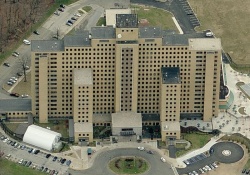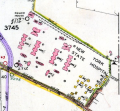Difference between revisions of "Creedmoor State Hospital"
(→Images) |
(→Images) |
||
| Line 43: | Line 43: | ||
File:Creedmoor02.png | File:Creedmoor02.png | ||
File:Creedmoor03.png | File:Creedmoor03.png | ||
| + | File:Queens1928.png | ||
</gallery> | </gallery> | ||
Revision as of 21:28, 24 February 2012
| Creedmoor State Hospital | |
|---|---|
 | |
| Construction Began | 1912 |
| Current Status | Active |
| Building Style | Cottage Plan |
| Alternate Names | Creedmoor Psychiatric Center |
History
Creedmoor Psychiatric Center in Queens Village, Queens, New York, provides inpatient, outpatient and residential services for severely mentally ill patients. The history of the hospital and its campus, which occupies more than 300 acres (1.2 km²) and includes more than 50 buildings, reflects both the urbanization of the borough of Queens, New York, and a series of changes in psychiatric care.
Early History of the Site
The hospital’s name derives from the Creeds, a family that previously farmed the site. The local railroad station on a line that ran from Long Island City to Bethpage took the name Creedmoor, apparently from the phrase “Creed’s Moor,” describing the local geography. In the early 1870s, New York State purchased land from the Creeds for use by the National Guard and by the National Rifle Association (NRA) as a firing range. The Creedmoor rifle range hosted prestigious international shooting competitions, which became the forerunner of the Palma Trophy competition. In 1892, as a result of declining public interest and mounting noise complaints from the growing neighborhood, the NRA deeded its land back to the state.
History of the Hospital
In 1912, the Farm Colony of Brooklyn State Hospital was opened, with 32 patients, at Creedmoor by the Lunacy Commission of New York State, reflecting a trend toward sending the swelling population of urban psychiatric patients to the fresh air of outlying areas. By 1918, Creedmoor’s own census had swollen to 150, housed in the abandoned National Guard barracks. By 1959, the hospital housed 7,000 inpatients. Creedmoor is described as an overcrowded, understaffed, depressing institution in Susan Sheehan's Is There No Place On Earth For Me? (1982), a biography of a patient pseudonymously called Sylvia Frumkin.
The hospital's census had declined by the early sixties, however, as the introduction of new medications, along with other factors, led to the deinstitutionalization of many psychiatric patients around the world. By 2006, parts of the Creedmoor campus had been sold and the inpatient census was down to 470.
Programs
The hospital’s notable ventures include The Living Museum, which showcases artistic works by patients and is the first museum of its kind in the U.S. In addition, Creedmoor is home to a self-appointed Chassidic Rebbe known as the Admou"r meCreedmoor. The Admou"r is suspected of taking advantage of his diagnosis of multiple personality syndrome in order to defraud Federal and State entitlement programs.
Between the years of 1961 and 1966 LSD-25 was tested on a group of schizophrenic children in the hospital's Children's Unit.





